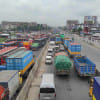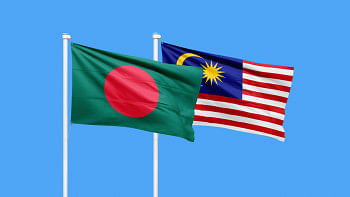What does the traffic disruption on the Dhaka-Ctg highway mean for the economy?

The disruption in the Dhaka-Chattogram highway for the last six days amid violence centring the quota reform movement has dealt a huge blow to the economy, damaging the pipeline for around 90 percent of the country's $120 billion trade and causing fears of a lasting ripple effect.
A huge number of industrial establishments have been built along the highway, hoping to capitalise on the connectivity to the country's largest seaport in Chattogram.
However, that means their supply chain is also dependent on the proper functioning of the highway. Furthermore, most of the tourism sector is also reliant on the highway as it links Dhaka to Cox's Bazar, the country's single largest tourist destination.
Against this backdrop, economists and businessmen were desperately seeking to ensure the security of the highway and guarantee hassle-free movement.
Agitators prevented vehicular movement on the highway several times this month, severing road connectivity, while protesting Cumilla University students shut it down as recently as Wednesday.
A few vehicles started using the highway on July 22.
According to data from the Roads and Highways Department (RHD), on average around 35,000 to 40,000 vehicles use the four-lane highway daily.
Among the vehicles, 35 to 40 percent are goods-laden, an RHD official said, citing data from toll plazas at Meghna bridge and Gumti bridge along the highway.
"But, the number of vehicles was very thin in the last few days," the official added.
Only 8,550 vehicles used the highway on Sunday, according to data from these two toll plazas. From midnight to 7pm on July 22, 10,018 vehicles used the highway.
Another RHD official said the highway was cleared of debris last night but the road from Jatrabari flyover area to Shitalakhya bridge was severely damaged as agitators had started a number of fires.
Additionally, barriers, medians, signs and signals along the highway were either burned or looted, which is expected to pose further problems, the official said, asking not to be named.
The closure of the highway is also a source of huge sufferings for tourists and general passengers.
Khandaker Enyet Ullah, secretary general of the Bangladesh Road Transport Owners Association, said many tourists were stuck in Chattogram and Cox's Bazar due to the situation.
Prof Md Shamsul Hoque, a noted transport analyst, said the country is dreaming of becoming a developed nation by 2041. Although Bangladesh's $450 billion economy is mostly dependent on the Dhaka-Chattogram route, the government is yet to turn it into an expressway.
The four-lane road is not of the quality required for the expected economic development, he opined, adding that expressways are the best way to ensure connectivity, reduce travel time and congestion, and ensure reliability.
He added that exporters also demand a quality road connection since their activities are time-sensitive. "They are ready to pay a handsome amount to use quality roads. General people will also pay for it when they get proper service," Hoque said.
Bangladesh has eight highways. But the Dhaka-Chattogram highway undoubtedly deserves to be an expressway given its economic importance since it has enormous multiplier effect as it is also connected with major tourism hubs, he added.
Fazlul Haque, a former president of the Bangladesh Knitwear Manufacturers and Exporters Association, said the country's main seaport would be better served by a railway connection, which is the most popular method in the world to carry goods.
However, even railway services remained shut down during the past six days.
The Pangaon water port is not an attractive option either as it lacks adequate infrastructure and supporting facilities. It also takes longer to send goods, he added.
A top official of a leading garment manufacturing company, preferring anonymity, said when he was travelling via the Dhaka-Bhanga expressway, he felt this type of expressway was required to connect Dhaka and Chattogram.
As the corridor has a huge economic impact, an expressway could lead to greater contributions to the economy.
However, this road remains poor although it has much higher economic demand.
The Mongla port has a much lower impact on the economy, but the government is spending a huge amount of funds on the roads leading to that while the Dhaka-Chattogram highway remains in a poor state. This is not logical, Fazlul Haque added.


 For all latest news, follow The Daily Star's Google News channel.
For all latest news, follow The Daily Star's Google News channel. 








Comments